What Happens If You Stop Paying Credit Cards?
What Happens If You Stop Paying Credit Cards?
One of the most urgent financial issues facing Americans is credit card debt. Credit cards are used by millions of Americans for daily expenses, but when payments are stopped, the situation may quickly get out of hand. The Federal Reserve reports that in 2023, credit card balances in the United States hit all-time highs, surpassing $1 trillion.
However, what actually occurs if you don’t make your credit card payments? Could it result in litigation, wage garnishments, and permanent credit ruin, or is it merely a late fee? This in-depth report explores the step-by-step consequences of unpaid credit cards and the solutions available to consumers.
HSBC Cashback Credit Card 2025 – Benefits, Rewards & How to Apply?

The Direct Effect: Stage of Missed Payment (0–30 Days)
The consequences of missing your initial credit card payment are minor, but they set off a domino effect:
- Late Fees: The majority of credit card companies impose late fees ranging from $25 to $40.
- Loss of Grace Period: Interest on purchases starts to mount right away.
- Credit Score at Risk: Missing a payment even once raises utilization ratios if balances build, although payments must be more than thirty days past due before being reported to credit bureaus.
Immediate Repercussions (30–90 Days Late)
The scenario gets worse if you cease paying completely:
- Credit Reporting: When a payment is 30 days past due, Experian, Equifax, and TransUnion are notified by creditors. This results in a decrease in credit ratings, typically by 60 to 110 points.
- Increased Interest Rates: APR penalties are applied by several card issuers, which can cause interest rates to rise to 29.99%.
- Collection Calls Start: You should anticipate receiving a lot of reminders to pay via letters, emails, and calls.
Medium-Term Repercussions (Delays of 90–180 Days)
There are serious repercussions after three to six months of nonpayment:
- Account Charge-Off: Creditors are legally obligated to “charge off” the debt, which means it is recorded as a loss on their books, 180 days after the due date.
- Agencies for Debt Collection: A third-party debt collector, who may employ forceful methods, either purchases the account or transfers it to them.
- Credit Damage Gets Worse: Access to loans, mortgages, and even rental applications may be severely restricted if you have a charged-off account that stays on your credit report for seven years.
Legal Risks Over an Extended Period (Beyond 180 Days)
Legal repercussions could ensue if delinquent credit cards remain due:
- Debt Collection Lawsuits: Creditors or collection agencies can sue for the balance.
- Court Judgments: If the court rules against you, they may obtain a judgment to collect the debt.
- Wage Garnishment: In many states, creditors can garnish wages, seizing up to 25% of disposable income.
- Bank Account Levies & Liens: Some judgments allow creditors to freeze bank accounts or place liens on property.
Credit Score & Financial Life Impact
Stopping credit card payments can affect nearly every aspect of financial life:
- Credit Score Damage: A single charge-off can reduce a score by 100+ points.
- Loan & Mortgage Denials: Lenders often reject applicants with unpaid credit card debts.
- Employment & Housing Risks: Some employers and landlords review credit reports during background checks.
- Higher Insurance Premiums: In some states, poor credit correlates with increased auto and home insurance costs.
Debt Collection Tactics to Expect
If your debt goes into collections, here’s what typically happens:
Frequent Calls & Letters (within FDCPA limits).
- Settlement Offers: Collectors may propose lump-sum payments for less than the full balance.
- Potential Harassment: While laws prevent abusive practices, many consumers still report intimidating tactics.
- Resale of Debt: If one collector fails, the debt may be sold again, keeping the cycle alive.
Choices If Credit Card Payment Is Not Possible
Although it may seem hopeless, there are a number of financial and legal options available:
Credit Counseling
Nonprofit agencies help create a debt management plan (DMP), reducing interest rates and consolidating payments.
Debt Settlement
Negotiate with creditors to pay a portion of the debt. Effective but damaging to credit scores.
Balance Transfers & Consolidation Loans
Transfer debt to a lower-interest card or consolidate into one loan, though eligibility depends on creditworthiness.
Hardship Programs
Some credit card issuers offer temporary payment relief due to unemployment, illness, or other hardships.
Bankruptcy
As a last resort, Chapter 7 or Chapter 13 bankruptcy can eliminate or restructure credit card debt, but it remains on credit reports for 7–10 years.
Professional Guidance: Suggestions from Financial Advisors
Don’t ignore the issue: Interest and fees cause unpaid debt to increase quickly.
- Talk to Your Creditors Early: Rather than selling to collectors, many issuers would rather arrange payment arrangements.
- Be Aware of Your Rights: Customers are shielded from harassment by the Fair Debt Collection Practices Act (FDCPA).
- Seek Professional Assistance: Customized solutions can be obtained from certified credit counselors and bankruptcy lawyers.
The Human Factor: The Emotional Cost
Stopping credit card payments has emotional repercussions in addition to financial ones:
- Depression, stress, and worry brought on by ongoing collection efforts.
- When debt impacts shared finances, family connections become strained.
- feelings of guilt or shame, despite the fact that many debts result from medical problems or job loss.
Preventing the Worst: Proactive Strategies
Create Emergency Savings: Even $500–$1,000 can prevent missed payments.
- Automate Payments: Avoid accidental late payments.
- Prioritize High-Interest Debt: Use methods like the debt avalanche strategy.
- Avoid Minimum Payments Trap: Paying only the minimum can extend debt for decades.
Conclusion: There are solutions, but stopping payments is risky.
The path from a simple late charge to lawsuits, garnishments, and permanent credit harm is real if you stop paying your credit cards. Customers are not helpless, though. There is a route to financial recovery by being aware of the repercussions and investigating your alternatives, which range from bankruptcy to credit counseling.
The main takeaway is to act quickly, be aware of your rights, and get expert advice before minor late payments turn into crippling debt.
How to Avoid Payday Loan Traps: Smart Borrowing Tips for Financial Safety
How to Avoid Payday Loan Traps: Smart Borrowing Tips for Financial Safety
